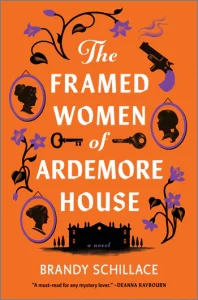Brandy Schillace’s debut mystery The Framed Women of Ardmore House is a classic fish-out-of-water crime novel. Jo Jones may have a drab name but she’s a fascinating woman: autistic, divorced, broke, an editor who loves mysteries and classic literature, and the surprised inheritor of an English country mansion.
It’s not remotely a show place. The once-magnificent gardens are dilapidated and the house is a wreck: there’s a major roof leak, filth, mold, and water damage throughout, and it’s all overseen by a creepy caretaker who has boundary issues.
Not surprisingly, he’s soon dead with Jo as the prime suspect because they’ve argued and she had him fired. As you might expect from an author who’s been a professor of Gothic Literature, the lights often go out in this book and there’s a mysterious portrait that Jo finds hanging in the wrong place before it disappears completely. The hunt is on! Who was the woman, who stole the portrait and why? That’s Jo’s mission while the police zero in on her as the murderer because of her barbed interactions with the caretaker.
Schillace has skillfully made Jo’s autism turn her into a suspect because her behavior is awkward to say the least. She seems to those around her either strangely detached and unemotional when you’d expect the opposite–but she can also flare up and panic. She can ramble and is frequently inappropriate in her questions and answers. As a stranger who is truly strange in the eyes of almost everyone in town, Jo is a magnet for suspicion.
But Jo has a keen memory that makes her a terrific amateur sleuth even if she sometimes has trouble reading people. Conversely, she can see connections that other people can’t and can make those connections faster.
Book lovers of all kinds will relate to her because she lives in books, noting “Always, I love words. The way they look and feel and smell. It’s hard to explain. Words have just always been my people. And I don’t forget them after I read them.”
This is a charming mystery with bite and filled with wonderful observations. Like these about the stodgy detective investigating the murder:
He did not want to be in the incident room on a Saturday. He wanted to go for a walk with the dog he didn’t have (but kept meaning to get) and have a pint somewhere with real food and the general hum of humans. Murders were damned inconvenient.
That parenthesis is delicious and so is that last line worthy of P.G. Wodehouse, though I suppose he would have used “dashed.”
With plenty of suspects, the book is a fine blend of darkness and light and will make an entertaining weekend read wherever you are. ★★★★★
Lev Raphael has reviewed books for The Detroit Free Press, The Washington Post, Jerusalem Report and several NPR stations in Michigan. His suspense novel Assault With a Deadly Lie was a Midwest Book Award finalist.

